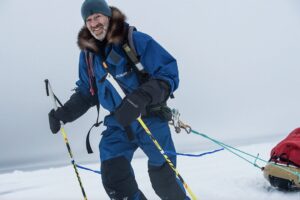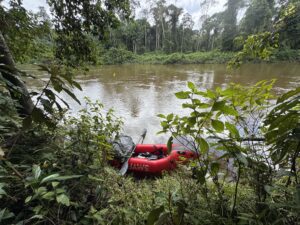Climbing mountains, skydiving and polar expeditions are some peoples wildest dreams, and others worst nightmares. But what is it within us that makes some relish the thought of a challenging, adrenaline fuelled activity, while others avoid it like the plague. Is it as simple as our personality traits? Or is it deeper rooted in how we have been brought up, and our life experiences?
Optimism, patience, idealism and courage are the four traits Sir Ernest Shackleton said an explorer needed to succeed, but is this really the case? Are they really the only four traits you need to cope with mental and physical challenges thrown at you by extreme environments?
Peter Suedfeld is one of the foremost experts in Restricted Environmental Stimulation Therapy (REST). For decades he has researched how humans cope with and adapt to extreme environments and stressful situations. His studies have ranged from looking at how people cope in space and Polar Regions, to the psychological impacts of high-level military decision-making and the long-term adaptions of survivors of the Holocaust.
Born in Hungary, Suedfeld is himself a survivor of the Holocaust. He was taken in by a Red Cross orphanage in 1944 with false Christian papers, and told to never to reveal his name, background or any signs that might reveal he is Jewish. He lost both his parents in concentration camps. In 1948, he emigrated to the U.S. and served in the military for three years before studying psychology. In 1972, Suedfeld moved to Canada as a professor of Psychology at the University of British Columbia.

Peter Suedfeld
ExplorersWeb spoke to him about his research, how humans cope with extreme environments and isolation, and the traits that successful adventurers need.
Throughout your career you have studied stressful environments and how people cope with them. Was it something in your own personality that prompted you to look into this?
To some extent, although I didn’t realize that until I had been doing this kind of research for a couple of decades. People ask me why I did it, and I said, well, I don’t know, I just I find it interesting. Eventually I realized that there were things in my own early history that helped to explain it. I knew people who had gone through very challenging and even traumatic experiences, and I have gone through some myself, and we did not show the predicted catastrophic deterioration or the inability to cope and the permanent damage.
I realized that the general outlook of my profession was more negative than the results justified. So I got into a wide variety of challenging, dangerous and even traumatic environments. The traumatic ones were things like surviving genocide. Everybody recognizes that flying in space, climbing mountains and undersea diving are challenging and potentially dangerous. They can be unpleasant and stressful, but they’re not traumatic or so challenging that they interfere with people’s lives. The proof is, people keep going back to those activities. If they were really all that unpleasant, why would they continue to do it unless they’re all neurotic masochists? And I don’t think there’s any evidence to indicate that.
Even people who go through trauma, such as Holocaust survivors, of which I happen to be one, and other victims of horrible experiences such as persecution and military combat usually come back and lead normal lives like anybody else. They’ve managed to overcome whatever negatives they’ve experienced. So its not all doom and gloom.

The International Space Station. Photo: NASA
Which is harder to deal with, stressful environments or isolation?
It very much depends on the individual, but in general, if you’re the type of person who copes well with extreme challenges, you will also be someone who copes well with minor ones. One of the things that’s pretty clear is that people who have experienced moderate levels of stress early in life, and coped with that, are much more stress-resistant later in life, and much more able to cope with severe challenges.
Many families try to shelter children from challenges and stress in general. That leaves the kids without coping skills and strategies or the self-confidence to take on a challenge. Then when they grow up and they do experience difficulties, they have problems because they’re unprepared. It’s good to let kids experience moderate levels of stress and difficulty.
Are there any other personality traits besides self-confidence that make people suited to extreme environments?
Psychologist Frank Farley identified something called the thrill-seeking personality. Mountain climbers would be thrill seekers. The people who fit that definition are more comfortable dealing with challenging situations.
The kinds of people we’re talking about are prepared to face difficulties — the public at large is not. When something like this lockdown occurs, they don’t know how to cope because they’ve never encountered it before. They’re not prepared. They’re not there voluntarily.
I get asked how astronauts can live in the International Space Station for six months at a time. The isolation and confinement doesn’t seem to bother them as much as it is now bothering people sitting at home for two months during lockdown. The reason is that astronauts are highly selected. They’re trained. They’re equipped. They have tasks to perform. They don’t have a whole lot of empty time like we do in lockdown. So psychologically, it’s an easier experience for them.

Astronauts training in a Neutral Buoyancy Lab. Photo: NASA
You’ve said that the best way to avoid problems on polar expeditions is to screen candidates carefully. What makes someone suitable or unsuitable?
It depends on the environment. With mountain climbing, physical strength is pretty important. For astronauts, not so important.
We’ve found that ideally, in a group, you want people who are sociable introverts: who like to be with others, like to socialize, but don’t really need it. Isolation won’t make them uncomfortable, but they also interact well with others.
You also want people who keep an even keel, who are predictable in the sense that their companions know what to expect from them emotionally. We don’t want somebody who wakes up irritable one morning, depressed the next.
What screening procedures show who is suitable or unsuitable for extreme environments — for example, for polar expeditions?
There’s very little in the way of screening for polar expeditions. Typically, the organizer advertises for volunteers, and generally, there aren’t an overwhelming number of them. You have to start out by identifying what specific skills and knowledge you need in your group.
For example, you’d likely want at least one person with medical training, in case of accidents. You don’t get a whole lot of people with that skill who also volunteer.
Astronauts are different because there are always thousands of applicants. There are a lot of interviews and psychological tests, as well as medical and physical tests. There are simulations where you send people out together into the wilderness and see how they cope and get along with each other. Aspiring astronauts are tested for months, then they train for years before they ever go up. So there you have a lot of choices.
Are the people who go on polar expeditions similar to the type of people who work in those regions as researchers?
To some extent. If you are a polar adventurer, you are going to invest a year or more to prepare and then do it. You also need more physical strength than a researcher or Antarctic base worker, so it differs from situation to situation.
Then you get the people who want to do solo expeditions, and that’s a very different kind of person. That’s somebody who is so self-confident that they don’t think they’re going to need help, no matter what happens. They’re willing to go out alone, where if something goes wrong, the chance of rescue may be pretty low. So they’re saying, OK, if something bad happens, I’ll die there. A lot of people are not willing to do that. If you go with a large group, it is also different from when you go with one or two other people.

Mike Horn crosses Antarctica. Photo: remy-cointreau.com
Is there anything people considering a solo expedition could do to self-screen to see if they are suited for that sort of isolation and stress?
People act differently when they’re under stress and when they’re not. You can be very friendly and kind and generous when you are sitting in a nice, comfortable home, but put you under stress in the wilderness and you may lose that. You may suddenly become hostile and uncooperative and self-centered. So there are no really good tests for seeing how people behave under stress unless you actually put them under stress. You have to create a simulation that replicates some of where they want go and what they want to do, and see how they cope.
Is anything people can do to improve their ability to cope with isolation and expedition stress?
Yeah, for example, go through this pandemic lockdown for two months, and then you’ll know how you cope with isolation. You know, maybe the pool of volunteers is going to increase tremendously after this. Everyone is going to want to sign up.
A lot of your studies have focused on isolation in space or in the polar regions. Do you think you would have similar results in deserts or rainforests? Or do you think the polar regions cause more stress?
I don’t think so, but different environments might lead to different stresses. Adventurers skiing across an ice cap need different skills from people trekking across the Sahara or climbing Mount Everest. If you’re alone, you don’t have to have social skills. If you’re in a small group, you may be able to choose people who are compatible with you. If you’re in a large, organized group, you may be with people whom you don’t like. Traveling — walking, skiing, climbing cycling — tends to be more stressful than staying in one place for a prolonged time.
The astronauts on the space station stay there for six months or so, then they come back. People who are going to Mars will be in the spaceship for half a year or more. Different situations require very different skills and mind-sets.
Are any differences in how well men and women cope with isolation and extreme environments?
In general, we haven’t found differences between men and women in personality, although there are certainly differences in the way men and women are treated in these environments, for example, in polar stations. Not so much anymore, but when women were less frequently there, we found two things: Men either viewed them as romantic opportunities or treated them sort of as sisters or mothers, whom they could go to for sympathy and support when they had a problem. Men tend not to do that with other men. Now that there are more women in these situations, there is less of that.

British Halley VI Research Station. Photo: bas.ac.uk
Is there a difference in how different age groups deal with isolation?
Yes, there is. Most people are surprised by this, but the younger groups do not do as well. They tend to get impulsive, impatient, disappointed, frustrated, and so on. Older people tend to tolerate isolation and stressful environments much better. They’ve learned how to deal both with other people and with themselves when they are upset. They also likely have more experience in that kind of environment, so the problems that they encounter are not totally new to them.
My own theory — and I haven’t really tested it — is that you can divide people in those environments into two groups. Some confront a problem with the environment by changing their expectations and accepting that the situation isn’t perfect. The other group tries to change their environment. There is some overlap between the two groups, but it’s interesting that these two different approaches haven’t been studied. One of these days, I might.
Do you think one of those groups cope better?
Both approaches work. In the literature, there is a distinction between coping strategies that are problem-oriented and coping strategies that are emotional. Emotional would be them saying we just need to adjust to it, just accept the situation and decide that it’s not all that negative. Problem-solving involves actually fixing the problems, for example, juryrigging whatever equipment you have to make it work in those circumstances.
| Short Expeditions |
| High motivation to achieve |
| High sense of adventure |
| Low susceptibility to anxiety |
| Long Expeditions |
| Over 30 years |
| Emotionally stable |
| Low neuroticism |
| Introverted but socially adept |
| Not greatly assertive |
| Low demands for social support |
| Sensitive to needs of others |
| Does not become bored easily |
| High tolerance to lack of achievement |
Characteristics of the ideal person for polar expeditions. Adapted from: Palinkas LA, Suedfeld P (January 2008). “Psychological effects of polar expeditions”. Lancet. 371 (9607): 153–163.
In one paper, you make the case that the characteristics of the ideal person for polar expeditions depends on whether the expedition is long or short. How would you define a long vs a short expedition?
There’s no hard and fast cut-off point, but generally any deployment that lasts six months on site, not including selection and training, is a long expedition. It would be this group that is most likely to display symptoms of Polar T3 syndrome [where a decrease in the thyroid hormone T3 leads to mood swings, forgetfulness, indecisiveness, self-isolation and even the fugue state known as the Antarctic stare]. Short-term residents in Antarctica can exhibit some of these symptoms, but usually fleetingly and not very severely.

Børge Ousland. Photo: explorers.org
Is T3 related to the polar darkness? Would a daylight-balanced lamp prevent it?
T3 can happen anytime, but overwintering personnel are much more likely to suffer from it. But it’s also colder in winter, people are stuck inside more, they stay longer [speaking of Antarctic stations] and they’re more isolated, so there are a lot of factors besides darkness. I don’t know about using an S.A.D light to counteract it, but I’d be surprised if it hasn’t been tried.
Is T3 responsible for such classic tales as the two trappers who divided their cabin with a strict line down the middle? Or the plane engineer in the High Arctic who, after a long winter, wanted to fly back south sitting on the wing?
Calling all psychological disruptions Polar T3 is very handy, but a diagnosis of T3 should not be assigned unless there are also the hormonal changes.






